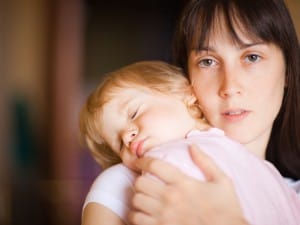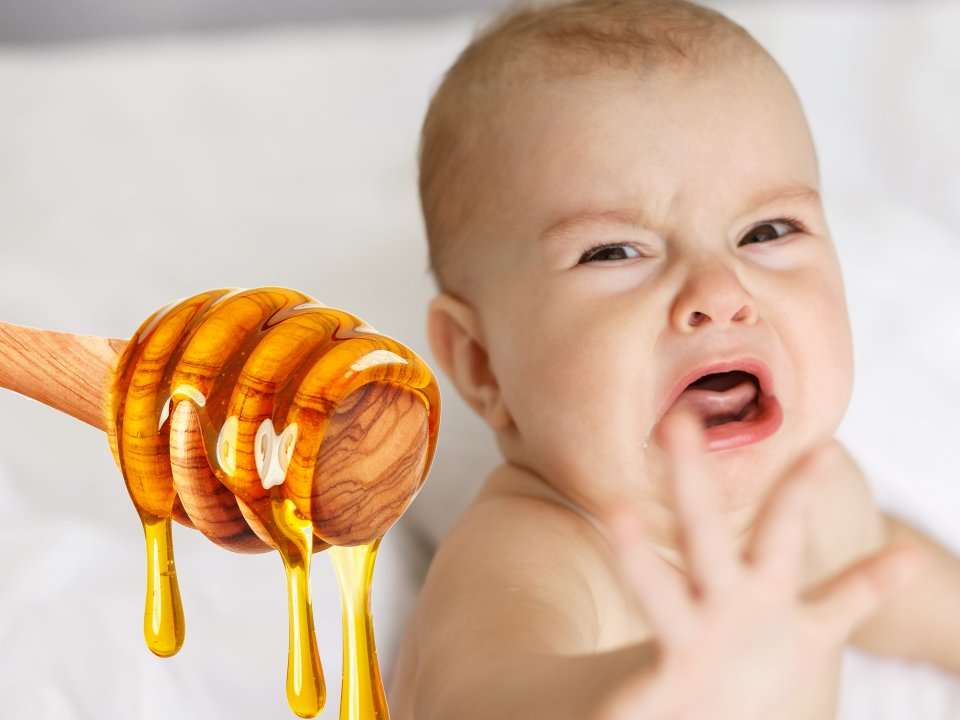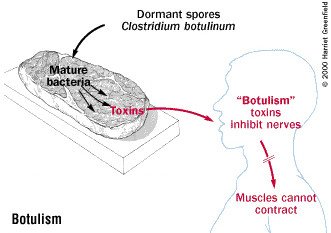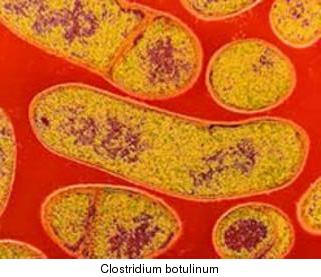botulism in babies timeline
Infant botulism is a rare but serious gastrointestinal condition caused by exposure to Clostridium botulinum C. Infant botulism most commonly affects babies 3 weeks to 6 months old but babies are at risk until they are 1 year old.

How To Start Your Baby On Solids An Infographic Smart Nutrition With Jessica Penner Rd Baby Food Chart Baby Food Recipes Baby Milk
Food-borne botulism arises when food becomes contaminated with C botulinum spores and then is stored improperly.

. These bacteria are harmless to older kids and adults. Infants are less able to suck and their face loses its expression. Risk factors include swallowing honey as a baby being around contaminated soil and having less.
For this reason experts advise that babies shouldnt eat honey until they are at least 1 year old. Infant botulism occurs mostly in young infants between 6 weeks and 6 months of age. Honey is a known source of the bacteria spores that cause botulism.
About 90 percent of infants with botulism are younger than. The neurotoxin binds to cholinergic nerve terminals and cleaves intracellular proteins necessary for acetylcholine release resulting in bulbar. The youngest reported patient was 2 weeks and the oldest was 12 months.
Consultation Treatment and Testing Steps Infant botulism is a medical emergency. Thats because their mature digestive systems can move the toxins through the body before they cause harm. Infants who acquire botulism range in age from six weeks to nine months with the peak incidence occurring at two to three months of age.
Different from foodborne botulism caused by ingestion of pre-formed toxins in food it occurs when infants ingest C. Botulism is a broad term encompassing 3 clinical entities caused by botulinum toxin. All types of botulism can be fatal and are considered medical emergencies.
Botulinum toxin causes weakness and loss of muscle tone because it blocks the nerve endings ability to signal the linked. Foodborne botulism was the first of the 3 entities to be described. Symptoms of botulism in infants may occur up to 14 days later.
It may occur as early as early as 6 days and as late as 1 year. Botulism is caused by poisons toxins produced by spore-forming bacteria called Clostridium botulinum. What are the symptoms.
Babies are at risk of infant botulism until they reach about 1 year of age. How soon after exposure would symptoms develop. In Canada honey is the only food that has been linked to infant botulism.
Botulinum spores which germinate into bacteria that colonize in the gut and release toxins. Infant botulism occurs most often in infants 6 months. Before their first birthday their digestive system has not become developed enough to.
About 90 percent of infants with botulism are younger than. The disease results after spores of the bacterium Clostridium botulinum or related species are swallowed temporarily colonize an infants large intestine and produce botulinum neurotoxin. You can help reduce the risk of this disease by only feeding honey to healthy children over one year of age.
Wound botulism develops when clostridium bacteria gets into a wound and grows. Infant botulism usually affects babies who are 3 weeks to 6 months old. Then the muscles become weak beginning in the face and head and eventually reaching the arms legs and muscles involved in breathing.
Please report any suspect infant botulism case to your local health jurisdiction through appropriate channels. Botulism can be a very serious disease that can cause abnormal functioning of the nerves leading to weakness and paralysis. Thats because their mature digestive systems can move the toxins through the body before they cause harm.
Infant botulism most commonly affects babies 3 weeks to 6 months old but babies are at risk until they are 1 year old. The condition can occur in. Infant botulism usually affects babies who are 3 weeks to 6 months old.
This most common form of botulism begins after Clostridium botulinum bacterial spores grow in a babys intestinal tract. Propagation of this toxin under different circumstances can lead to food-borne wound or infant botulism. Infant botulism is an intestinal toxemia.
It typically occurs in babies between the ages of 2 months and 8 months. Do not wait for laboratory confirmation to initiate consultation or treatment. Babies are at risk of infant botulism until they reach about 1 year of age.
In about 90 of infants with infant botulism constipation is the first symptom. Infant botulism occurs mostly in infants under 6 months of age. Bacteria from the spores can grow and multiply in a babys intestines producing a dangerous toxin.
These bacteria are harmless to older kids and adults. Byzantine Emperor Leo VI documented cases of fatal food poisoning in the. Infant botulism results from the ingestion of the C.
Botulinum spores and subsequent colonization of the small intestine. What is infant botulism IB. Unlike food-borne botulism infant botulism is caused by ingestion of spores not by ingestion of a preformed toxin.
This type of botulism most often occurs in people who use a. Infants are susceptible to infant botulism in the first year of life with more than 90 of cases occurring in infants younger than six months. Infant botulism is the infectious intestinal form of botulism which results when swallowed spores of a particular bacterium Clostridium botulinum colonize the babys large intestine and produce botulinum toxin in it.
Infant botulism usually affects babies who are 3 weeks to 6 months old. Symptoms can begin 3 to 30 days after the spores are swallowed. Symptoms generally begin 12-36 hours after eating contaminated food but may occur as early as a few hours and as late as 10 days.
Infants with botulism appear lethargic feed poorly are constipated have a weak cry and poor muscle tone. Eyelids droop crying is weak and drooling may increase. Babies should be at least 12 months old before they eat honey.
Babies up to 6 months old are more likely to get infant botulism but it can occur in babies up to 1 year old. In most adults and children older than about 6 months this would not happen because. Causes of Infant Botulism Babies can get.
Infant botulism is a rare but serious form of food poisoning that can affect babies up to a year old. Title 17 California Code of Regulations CCR 2500 2593 26415-264320 and 2800-2812 requires that healthcare providers report known or suspected cases of infant botulism to the jurisdiction in which the patient resides.

Kids Eat In Color Ever Wondered Why Kids Can T Have Honey Until 1 Here S The Answer This Rule Was So Annoying To Me Because No One Ever Explains Why

Four Infants Hospitalized For Botulism After Using Pacifier Funny Pictures For Kids Pacifier Infant

Vestavia Pediatrics Did You Know That Children Under 1 Should Not Be Fed Honey Honey May Contain The Bacteria That Causes Infant Botulism A Rare But Serious Illness The Experts At
/babys-first-year-14-5b7c174cc9e77c0050bca8cc.png)
8 Month Old Baby Milestones And Development

Sengupta Hospital And Research Institute Infant Botulism Happens When A Baby Ingests Bacteria That Produce A Toxin Inside The Body Here Are The Symptoms Facebook

Babies Can T Eat Honey Because It Can Cause Infant Botulism Here S What That Means Business Insider India

Botulism Guide Causes Symptoms And Treatment Options

Babydoc Club Irl New Parents Honey Can Be Harmful For Baby Yes It S Tasty In Porridge But This Sweet Treat Has Been Linked To Rare But Serious Infant Botulism

What Parents Need To Know About Botulism

Welcome To The Infant Botulism Treatment And Prevention Program

Lizzie O Connor Ms Rd On Instagram A Baby Younger Than One Can Get Botulism By Eating Clostridium Botulinum Spores Foun Honey Clostridium Botulinum Spore

From Milk To Solids Baby Food Guidelines For The First Year Baby Food Chart Baby Food By Age Baby Food Recipes


